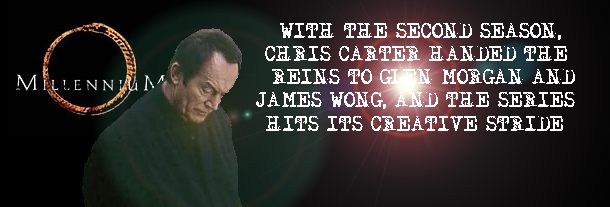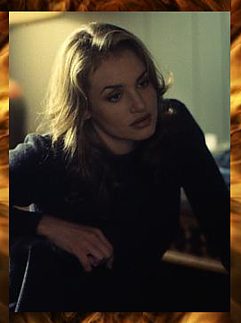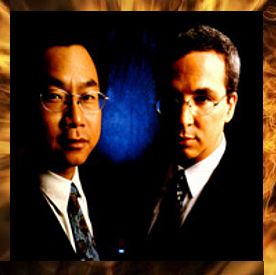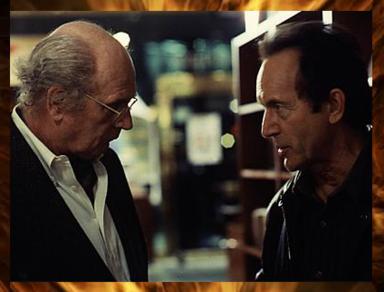

With Chris Carter busy guiding The X-files' fifth season and motion picture, he took a less hands-on approach to Millennium. The pair of Morgan and Wong earned their Carter stripes on the early days of The X-Files, before leaving to turn out their own, short-lived series, Space: Above And Beyond. When that show folded, they returned to The X-Files. Carter also gave the duo the task of consulting producers on the debut season of Millennium, and they also scripted three episodes of that season. However, Carter gave them full control of the series during the second season as they took the titles of executive producers. It was under Morgan and Wong that Millennium peeked, giving audiences many hours of fascinating drama (along with some unexpected humor, thanks to Glen's writer-brother Darin) as the world of Frank Black took some huge steps into the supernatural.
 Thomas J. Wright, the show's most frequent director, was the solo producer,
while co-executive producer titles went to Ken Horton and John Peter Kousakis.
Robert Moresco and Paul Rabwin shared the rank of co-producers. And, certainly
not least, was Chip Johannessen and Darin Morgan position as consulting
producers.
Thomas J. Wright, the show's most frequent director, was the solo producer,
while co-executive producer titles went to Ken Horton and John Peter Kousakis.
Robert Moresco and Paul Rabwin shared the rank of co-producers. And, certainly
not least, was Chip Johannessen and Darin Morgan position as consulting
producers.
The season opened with Frank desperate to save Catherine from the evil 'Polaroid Man' (played by Doug Hutchison, who also appeared as classic X-Files nasty Eugene Tooms), which resulted in a breakdown in their marriage, and separated them. Also, Frank begun to work more closely with The Millennium Group, and learn about their dark side, their beliefs, and the plans for the future. The shows major new cast addition was Kristen Cloke, who previously appeared in The X-Files episode 'The Field Where I Died', and Morgan and Wong's ill-fated series Space: Above And Beyond. Cloke, who is actually married to Morgan, portrayed Lara Means, a young woman who has a similar psychic ability, and a potential Millennium Group recruit. Cloke gave a wonderful performance as Lara, and was a key factor in the quality of season two.
Leading man Henriksen was immediately impressed with the duo of Morgan and Wong, and what he thought they'd bring to the party. "I really like them a lot. Their energy; their focus--they really made an attempt to open things up and say, 'Look, can we survive if we go this far?' They're almost diametrically opposite of Chris Carter, although they're not kidding around when it comes to [making sure] that we not trivialize issues, but that we become more artistic about it."
 Morgan and Wong went into Millennium's second season with a desire to shake
up what was, up to that point, a somewhat one-dimensional show. "Our
problem [with] the first season was that the shows were felt the same, because
the storytelling dealt with serial killers a lot," explained
Wong during the early days of their tour of duty. "We
wanted this season to have the rotation X-Files does, where there are monster
shows, there are conspiracy shows, there are weird science shows and then there
are more personal shows. Not to copy X-Files, but for Millennium , we want to do
the kind of thing where each week when you turn it on, you're not going to be
sure what you're watching. There are very scary shows that we still want to do,
but The Millennium Group is something that we haven't learned enough about, and
we want to get into that."
Morgan and Wong went into Millennium's second season with a desire to shake
up what was, up to that point, a somewhat one-dimensional show. "Our
problem [with] the first season was that the shows were felt the same, because
the storytelling dealt with serial killers a lot," explained
Wong during the early days of their tour of duty. "We
wanted this season to have the rotation X-Files does, where there are monster
shows, there are conspiracy shows, there are weird science shows and then there
are more personal shows. Not to copy X-Files, but for Millennium , we want to do
the kind of thing where each week when you turn it on, you're not going to be
sure what you're watching. There are very scary shows that we still want to do,
but The Millennium Group is something that we haven't learned enough about, and
we want to get into that."
One of the most drastic things Morgan and Wong did was to transform the Millennium Group from crime solving good guys to obsessive, scheming and possibly murderous doomsayers. One episode even went so far as to show how the Group could even predict a minor earthquake. "The show is about this man, Frank, who has a unique gift of perception, and a group of people who are willing to help start take a stand," says Morgan. "This year, the Millennium Group is showing Frank that there is a whole different plane, that it's not just this human evil, but that there are devils and angels, and in a few years from now it's either going to be fire and brimstone or a harmonic convergence."
Many felt that Catherine wasn't given much to do in the debut season, and Morgan and Wong went with the idea of keeping her and Frank separated during their batch of shows. "She's in three of the first four episodes, and then if she's not in a couple, it's because Frank is in Oklahoma or Arkansas," explained Morgan. "When they are together, there's not much conflict going on. It's harder to write them - I mean, what can you make interesting about a person who's just really, really supportive? This juices it up a little bit."
"Catherine can't be a member of the Millennium Group. That's a secret group and they're talking about metaphysical levels of good and evil. It really is goofy if she's involved in that, so taking them apart allows Frank to look back and say, 'Boy, that's all I want, just safety and security and a family.' We had to take it away from him so he can have this temptation - this year is a journey for Frank Black as he goes through these dark forces. There is a temptation to stop that journey, to go back to his wife, his child. And the journey for him is also to go back to what the yellow house was supposed to mean for them."
Frank's mental gifts was another area the writer-producers were eager to explore. "This year," revealed Wong, "He's not going to see a crime scene where the killer goes [makes a menacing gestures]. His gift allows him see something that we don't understand, and he has to work through it, and at the end it's, 'Oh, that's what my mind was telling.' It's not a logical jump; there are metaphysical leaps. He's getting into this plane where he understands that there are demons and angels, almost. He's certain that he sees what he sees, but he doesn't know it means."
 Despite the artistic success of the series, Millennium still wasn't rating as
strongly as it should, and everyone involved was feeling the pressure. Morgan
and Wong were aware of their show's lack of support from Fox, and cancellation
was always a possibility.
Despite the artistic success of the series, Millennium still wasn't rating as
strongly as it should, and everyone involved was feeling the pressure. Morgan
and Wong were aware of their show's lack of support from Fox, and cancellation
was always a possibility.
"I remember we were furious over the football playoffs in January," explained Morgan. "There was not one [advertisement] -- not even a 30-second spot -- for Millennium. So we were like, 'Hey what's the deal?' The static thing at the end [of season finale 'The Time Is Now'] was Darin's idea coming back from a football game. He goes, "You know, just fucking end the world! And it's just static." And I thought that was a great idea. But we were laughing at the time -- it was a joke. But then we got so mad that they didn't promote us that we started telling them, 'We're putting the equivalent amount of static for every promotion we did not get.' I don't think it was that long, of course, but it was Darin's idea."
Morgan and Wong were certainly kept busy after leaving Millennium; together they wrote the recent theatrical supernatural chiller Final Destination (co-starring Cloke), which Wong also directed and Morgan produced. In addition to this, they were behind the short-lived, underrated genre series The Others, which was produced by Dreamworks and attracted an incredible number of horror big shots, including Mick Garris, William Malone, Bill Condon, Tobe Hooper and even Clive Barker.
After season two concluded, Henriksen looked back and didn't seem overly content with what had been turned out. He did seem considerably more excited about the upcoming third season "[Last year] was a very hard year," Henriksen reported. "There were seven or eight scripts out of 23 that I really liked. The rest were attempts at things...they weren't bad, but they were attempts."
Millennium's second season was easily the best, with many outstanding episodes. Among them were Darin Morgan's brilliant 'Jose Chungs Doomsday Defense', and 'Somehow, Satan Got Behind Me', the fascinating 2-parter 'Owls' and 'Rosters', the surprisingly tender 'Midnight Of The Century', and the shocking season wrap-ups 'The Fourth Horseman' and 'The End Is Now', which seemed to suggest the human race was coming to an end, thanks to a deadly disease which ultimately claimed Catherine.
Glen Morgan and James Wong took Chris Carter's intriguing-yet-unfocused vision and made it great... and unfortunately were thrown aside by the man himself for Millennium's concluding season....